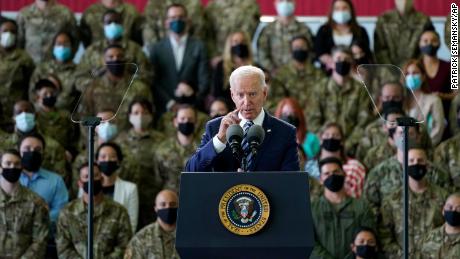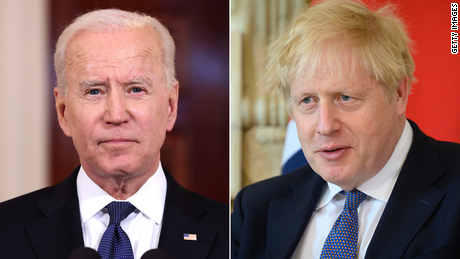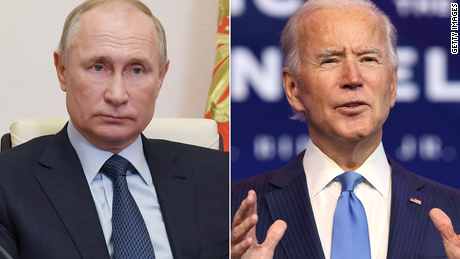Washington (CNN)President Joe Biden plans to address the strained US-Russia diplomatic relationship when he meets President Vladimir Putin next week with the hope that the two leaders can agree to send their ambassadors back to Washington and Moscow after months with no senior diplomat being present in either country, according to three sources familiar with the plans.
Russia's ambassador to the US Anatoly Antonov was recalled from Washington about three months ago after Biden called Putin a killer and US Ambassador to Russia John Sullivan left Moscow almost two months ago after Russia suggested he return to Washington for consultations. Not having an ambassador in either country has made conducting basic diplomacy even more difficult at a time when relations are already severely strained.
Their departures signaled a new low point in an already tense relationship, and their return appears to be the only modest deliverable that the Biden administration is eyeing out of the high-stakes summit. The aspiration comes as the Biden administration has tempered expectations that the US and Russia would come away from the meeting with any groundbreaking agreements.
"We don't think of US-Russia summits in terms of deliverables," National Security Advisor Jake Sullivan told reporters this week. "We are thinking of it as an opportunity to communicate what our intentions and capabilities are."
A State Department spokesperson said that Sullivan will "return to Moscow in the coming weeks" and that the US remains committed to "open channels of communication with the Russian government, both to advance US interests and to reduce the risk of miscalculation between our countries."
The US and Russia have engaged in tit-for-tat diplomacy which has shrunk the diplomatic footprint in each country dating back to the 1980s. But in recent years the reductions have been dramatic: In 2016 the US expelled 35 Russian intelligence operatives and shut down two Russian compounds, Putin expelled more than 700 US diplomats in 2017 and the US ordered Russia to close their consulates in San Francisco and Seattle in 2017 and 2018.
In April, the US imposed sweeping sanctions on Russia and announced it was expelling 10 Russian diplomats in response to Russia's election interference, cyberattacks, and human rights abuses in and the ongoing occupation of Crimea. In response, Russia announced that it was sanctioning eight senior US government officials, expelling 10 US diplomats and imposing sharp restrictions on personnel at the US Embassy.
Retired US ambassador Kenneth Yalowitz, who served two tours in Moscow and as ambassador to Belarus and Georgia, told CNN that he would like to see Putin and Biden agree to return restore the ambassadors to their respective capitals and "restoring the embassies to some of the levels that were there before all the sanctions."
"This is not really a favor; this is not giving into the Russians. This is very much in our interest to have a fully functional embassy in Moscow which can project our values, can explain our positions," he said.
Sending the ambassadors back to the capital cities of Cold War foes is viewed as a necessary step to keep open working-level dialogue between the two countries which will be pivotal as the Biden administration seeks a stable and predictable relationship with Russia, US officials told CNN. But they also acknowledge that more needs to be done to fix the deeply strained diplomatic relationship given the total number of US diplomats in Russia is at the lowest figure in modern history.
'Weaponization of diplomatic expulsions'
"There has been a weaponization of diplomatic expulsions in recent years that is dangerous," said Heather Conley, a former State Department official for European issues who is now a senior vice president at CSIS, who also noted the cutback on consular affairs and issuances of visas which has reduced valuable exchanges between academics, experts and scientists from the two countries.
Russia has also threatened to prevent the US from using locally employed Russian staff at the US embassy in Moscow -- a figure currently in the hundreds -- which would greatly diminish US capabilities at the embassy.
A State Department spokesperson told CNN that "the decision of the Russian government to prohibit the United States from retaining, hiring, or contracting Russian or third-country staff will have a direct impact on hundreds of staff members and contract employees in Moscow, Vladivostok, and Yekaterinburg -- colleagues who have dedicated themselves to working to advance positive relations between our two countries."
"Prohibiting their employment will also severely impact our operations, our remaining staff, and the mission community," they said. Sullivan briefed members of Congress in recent weeks about the status of the US diplomatic presence in Russia. Those briefed on the matter came away with a clear understanding that the status quo is not sustainable, explained two sources familiar with the briefings.
The Biden administration has appointed a number of Russia with significant experience as foreign service officers -- including stints in Moscow -- to powerful posts, demonstrating just how important it is to develop that expertise.
CIA Director Bill Burns, the US Ambassador to Russia during the George W. Bush administration, has been relied on heavily as the administration has developed a plan for how it will handle US-Russia relations, US officials told CNN. Another example is Victoria Nuland, the State Department Under Secretary for Political Affairs, who came through the ranks as a foreign service officer, spent time in Moscow and negotiated with the Russians throughout her career.
There are concerns among US diplomats and Russia experts about the possibility of future miscalculation if the diplomatic drawdowns continue or are forced to accelerated.
The limits in place could impede the US from developing Russia experts in the diplomatic corps who know how to interpret Russian signals, two US officials explained. Russian officials are known for being opaque and speaking in riddles, which is a challenge to understand for those without expertise. This is one reason the Biden administration is seeking to rebuild a more steady and regular US-Russia diplomatic relationship, the officials said.
Angela Stent, a professor at the Georgetown University School of Foreign Service and a former national intelligence officer for Russia at the State Department, noted that "less contact makes it more difficult to understand what is going on, especially in Russia."
"People at the State Department or at the Embassy need to be in regular contact with their counterparts, and to be able to comprehend how things function in Russia. Cutting back on personnel means losing some of that understanding," she said.
By holding the summit the Biden administration is signaling a desire to keep open communication, from the top down. National Security Adviser Jake Sullivan said that it is important for the president himself to articulate US expectations to Putin face-to-face, particularly because Putin has a "highly personalized style of decision-making," explained.
While sending the ambassadors back would not be a major deliverable, it would be a step towards stabilizing the fraught relationship which has been tremendously politicized in recent years which both leaders could cast in their favor.
"We know the US-Russia relationship is a difficult relationship and it will remain very difficult. But a lot of practical, day-to-day work we need to do to advance our arms control dialogue, manage our maritime border and mitigate the effects from climate change cannot happen if there are not people in place to do the work," said Conley. "Embassies without ambassadors and diplomats increase the likelihood that the US-Russia relationship will continue to slide toward crisis."







